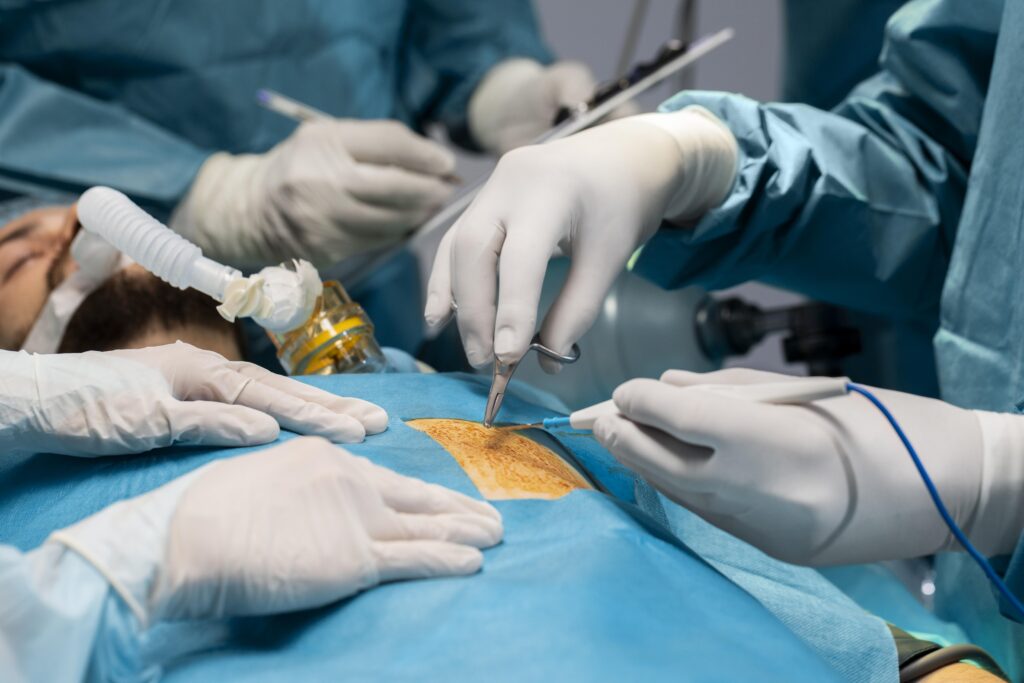Laparoscopy Surgery
Laparoscopy Surgeon in Pune
Laparoscopy surgery, also known as minimally invasive surgery or keyhole surgery, is a type of surgical procedure that uses a laparoscope to view and operate on organs or tissues in the abdomen or pelvis through small incisions in the skin. The laparoscope is a thin, flexible tube with a light and camera attached to it, which allows the surgeon to see inside the body without making large incisions.
During laparoscopy surgery, the surgeon makes small incisions in the abdomen or pelvis and inserts the laparoscope through one of the incisions. The camera attached to the laparoscope displays images on a monitor, allowing the surgeon to see inside the body and perform the procedure. Other small instruments are inserted through the other incisions to manipulate tissues and organs as needed.


Laparoscopy Surgeon in Pune - Dr. Shama Shaikh
Laparoscopy Surgery Has Many Advantages Over Traditional Open Surgery, Including:
- Less pain and scarring : Since laparoscopy surgery involves smaller incisions, there is less pain and scarring than with traditional open surgery.
- Faster recovery : Patients who undergo laparoscopy surgery typically have a faster recovery time and can return to normal activities sooner than those who have open surgery.
- Reduced risk of infection : The smaller incisions used in laparoscopy surgery reduce the risk of infection compared to open surgery.
- Shorter hospital stay : Patients who undergo laparoscopy surgery typically have a shorter hospital stay than those who have open surgery.
Laparoscopy Surgery Can Be Used To Diagnose And Treat A Variety Of Conditions, Including:
- Endometriosis : Laparoscopy surgery can be used to diagnose and treat endometriosis, a condition in which the tissue that normally lines the inside of the uterus grows outside of it.
- Ovarian cysts : Laparoscopy surgery can be used to remove ovarian cysts, fluid-filled sacs that form on the ovaries.
- Gallbladder disease : Laparoscopy surgery can be used to remove the gallbladder in patients with gallbladder disease.
Hernia repair : Laparoscopy surgery can be used to repair a hernia, a condition in which part of an organ protrudes through a weak spot in the abdominal wall. - Cancer : Laparoscopy surgery can be used to biopsy or remove cancerous tumors in the abdomen or pelvis.
Although laparoscopy surgery has many benefits, it may not be suitable for all patients. Your surgeon will evaluate your medical history and condition to determine if laparoscopy surgery is the right option for you.
Dr. Shama Shaikh Surve is the most recommended Laparoscopy surgeon in pune. She specializes in gastroenterology and breast surgery along with general problems.
fAQ's
During your consultation with a laparoscopy surgeon in pune, you can expect to discuss your medical history, symptoms, and any previous treatments you may have had. The surgeon will likely perform a physical exam and may order additional tests or imaging to evaluate your condition. They will then discuss treatment options with you, including whether laparoscopic surgery is an appropriate option for you, and what the procedure will entail. You will also have the opportunity to ask any questions or express any concerns you may have.
As with any surgical procedure, there are risks associated with laparoscopic surgery. Some of the most common risks include bleeding, infection, and damage to surrounding organs or tissues. There is also a small risk of complications related to anesthesia. However, these risks are generally lower with laparoscopic surgery than with traditional open surgery. Your surgeon will discuss the risks and benefits of the procedure with you in detail before the surgery and will take steps to minimize the risks as much as possible. Visit Dr. Shama Shaikh, Laparoscopy Surgeon in Pune and get proper consultation.
The length of a laparoscopy surgery varies depending on the complexity of the procedure and the surgeon’s experience. Most laparoscopic surgeries take between 30 minutes to 2 hours. However, more complex procedures such as hysterectomy or cancer surgery may take several hours. Your surgeon will provide you with an estimated time for the procedure during your consultation.
Recovery after laparoscopic surgery is generally faster than with traditional open surgery. Most patients are able to leave the hospital on the same day or within 1-2 days of the procedure. You may experience some pain, swelling, or bruising around the incision sites, but these symptoms are typically mild and can be managed with over-the-counter pain medication. You may be advised to avoid strenuous activity for a few weeks after the procedure.
